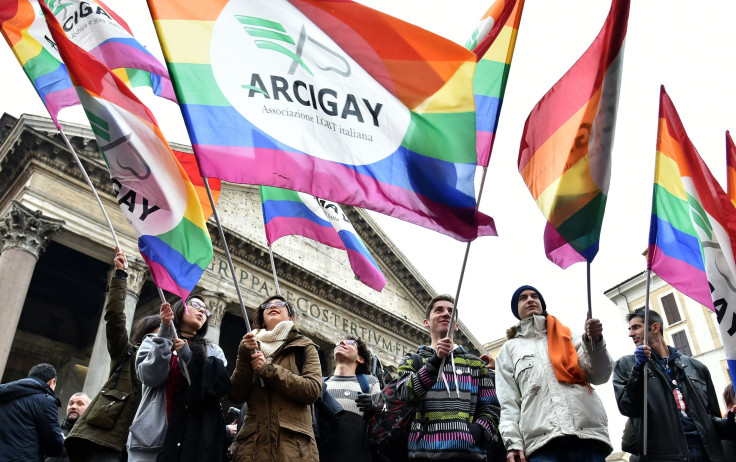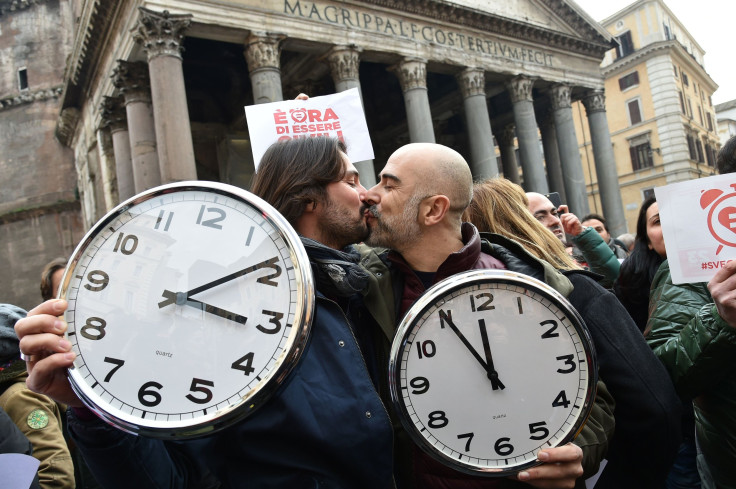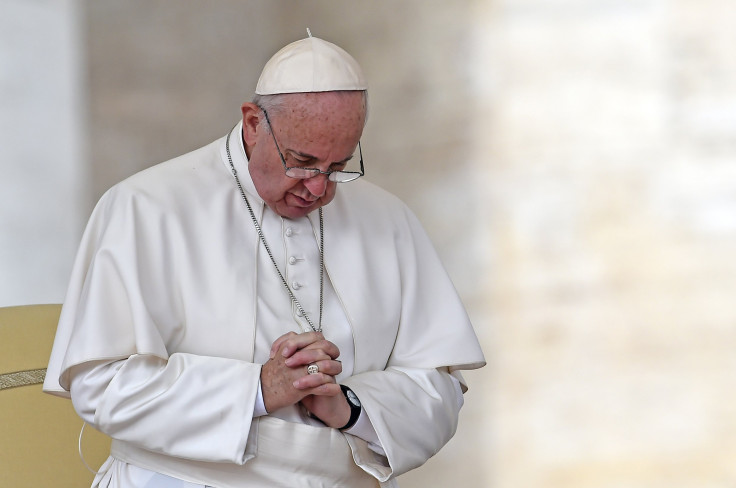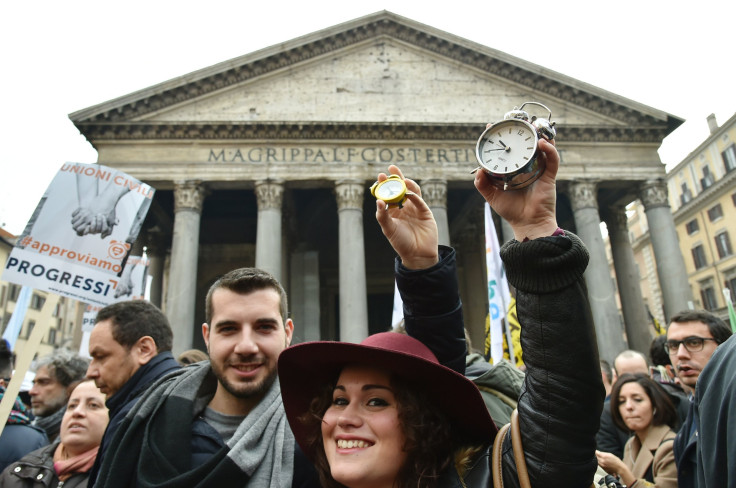Gay Marriage 2016: Italy’s Civil Union Law Could Help Its Struggling Economy

Camilla Seibezzi, like many parents, picks her daughter up after school, often taking her to swim at the local pool when it’s warm. Unlike other parents, however, Seibezzi, 50, needs a legal document saying she is an authorized caregiver in order to take her daughter just about anywhere.
“If the baby is going to the hospital, I have no right to visit her ... If I go to pick up my daughter at school, I need a paper,” she explained Tuesday. That’s because the Italian resident, LGBT activist and former Venice City Council member is not the biological parent of the daughter she helped raise with her former partner. Under Italian law, gay parents are not allowed to adopt the biological child of their partner.
A proposed law recognizing civil unions for gay and straight couples may change all that. Italy’s Parliament is slated to begin official debate Thursday on measures that would overhaul LGBT rights opposed by the Catholic Church. While opponents of the law point to the high costs of extending spousal pension rights and tax breaks to gay couples, economists, tourism professionals and gay advocates said the costs would be easily absorbed and would likely encourage more tourism to the country, providing a positive boost to Italy’s sluggish economy.

Tourism is a multibillion-dollar industry in Italy and one of its most important economic sectors. More than 1 million people are employed in tourism, in restaurants, hotels and tourist companies, and Italy ranks almost every year among the top five most-visited countries in the world, welcoming millions of international tourists annually.
“Italy is a major destination for gay tourism for the same reasons for which it is a destination for tourism in general: beauty, food, art,” said Andrew Lear, a former university professor who founded Oscar Wilde Tours, a gay tourism company that leads trips in Italy and throughout the world. The passage of the law would likely give a boost to tourism in the region, according to Lear, who said that while many of his potential clients were drawn to Italy for its art and culture, some couples did have reservations concerning its lack of civil protections for the LGBT community. “People say, ‘Why should we go to Italy? They don’t even have civil unions,’ ” he said.
A civil union law wouldn’t go unnoticed among gay travelers, said LoAnn Halden, a spokeswoman for the International Gay & Lesbian Travel Association, an umbrella organization of gay-friendly tourist companies. “We’ve certainly seen that around the world: Any time a country demonstrates a commitment to equality and respect for all its citizens, it sends a powerful message,” said Halden, adding, “A significant portion of the LGBT traveling community wants to spend their time and money in a place where their relationships are recognized.”
Italy is the only remaining country in Western Europe that has no form of legal recognition or protection for gay couples, be it marriage or civil unions. The presence in Rome of the Catholic Church at the Vatican, while not an official actor in Italian politics, has long held sway in deterring the passage of marriage equality, many locals said. Even Pope Francis, known for his progressive politics, has been firm on his traditional stance on marriage. “The family, founded on indissoluble matrimony that unites and allows procreation, is part of God’s dream and that of his church for the salvation of humanity,” Francis said last week to members of the Vatican Court, the Guardian reported.
“This is something you don’t see in other countries,” said Alessio Terzi, an Italian macroeconomist for the Brussels-based economic think tank Bruegel. “It’s not like the pope will come out and say something about Ireland passing gay rights laws.”
Under Italy’s constitution, marriage is defined as between a man and a woman. The proposed law would recognize gay and straight civil unions with similar protections given to married couples, including tax breaks, pension rights, as well as hospital proxy and inheritance rights. Legislators have continued to argue most fiercely over a clause that would allow gay spouses like Seibezzi to legally adopt the biological children of their partner.
“If it passes without Article 5, this would be a very, very big problem for the LGBT community,” said Seibezzi, referencing the article pertaining to adoption rights. “These children will be in the same condition for many years.”
The cost of extending spousal privileges would be absorbed into the budget, according to Terzi, contradicting claims made by right-wing members of Parliament who argued the legislation would cost 1.5 billion euros, or $1.6 billion, by extending the same tax breaks married couples get to gay people, as well as allowing them to inherit a portion of a deceased partner’s pension. The estimate made by the drafters of the bill is closer to 130 million euros, or $141 million, according to Terzi, to be spent in the period from 2016-2025.
“130 million euros can easily be accommodated within a budget, especially given it’s almost over a 10 year-horizon,” he said.

The Italian economy has been struggling under high deficits and slow growth since recessions in 2008 and 2011 struck the continent, sinking the euro and sending unemployment skyrocketing. While Italy has begun to recover in the past several years, Italian GDP per capita sank from around $40,600 in 2008 to less than $35,000 in 2014, according to the most recent data from the World Bank.
Tourism accounted for an estimated 5 percent of the nation’s GDP in 2015, according to a report from the World Travel and Tourism Council, an industry forum based in the U.K. While the tourism industry has remained strong, the gay market could be better integrated, according to industry professionals. The LGBT tourism market spends roughly $165 billion a year on leisure travel spending, according to a United Nations report.
Foreign couples in particular have long held commitment ceremonies in scenic Italy, particularly in Tuscany, despite the law against gay marriage, and the market for honeymoons and civil union ceremonies will likely expand if the law is passed, according to tourism professionals. In the United States, for instance, after the Supreme Court legalized gay marriage across the nation in June 2015, tens of thousands of couples who had waited years to be legally married joined a wedding industry worth $51 billion nationwide, according to Fortune. Gay couples were projected to add upwards of $200 million to the U.S. economy in wedding costs and tourism alone, according to a series of reports by the Williams Institute, an independent think tank studying sexuality, based at UCLA law school.

“We have had clients who have celebrated their symbolic ceremony, after being legally married in their hometowns, in Italy. Often these couples choose the frame of some of our great cities, such as Bellagio,” said Alessio Virgili, chief executive of Quiiky, an Italian gay travel operator that is perhaps best known for its tours of the Vatican that view the art of the Catholic Church through a gay perspective.
Other LGBT couples have often chosen more gay-friendly countries such as Germany over Italy, Virgili said. But the civil union bill could bump gay tourism in Italy by as much as 15 percent, according to research by Quiiky. “We are confident that if this law were approved, Italy could have the opportunity to attract new tourist flows,” he said.
© Copyright IBTimes 2024. All rights reserved.












